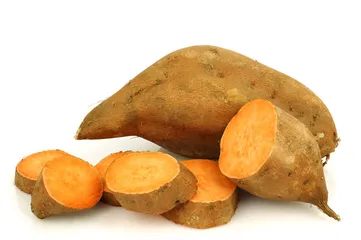Fast and healthy weight loss methods: supplementing 3 vitamins makes it easier to lose weight

Vitamin C-improves the metabolism of fats and lipids, especially cholesterol
To lose weight in winter, timely supplementation of vitamin C is the key to success! Vitamin C can synthesize carnitine and stimulate adrenalin. Carnitine can promote fat metabolism and accelerate the decomposition and burning of fat and lipids, while adrenalin can regulate mood and suppress brain appetite. Fresh vegetables and fruits are very rich in vitamin C, and in winter we can also select some seasonal fruits and vegetables to supplement vitamin C.
Recommended intake: The intake for adults over 18 years old is 100 mg/day, and 130 mg/day for pregnant women and nursing women in the middle and late stages of life.
1. Sweet potatoes
Calories: 99 calories/100 grams
Vitamin C content: 26mg/100g
The starch rich in potato foods has a protective effect on vitamin C and greatly reduces the loss of vitamin C during cooking. Among cooked vegetables, sweet potatoes are foods with high vitamin content! It contains water-soluble dietary fiber, which stimulates intestinal peristalsis and promotes smooth excretion. However, the fibrous structure cannot be absorbed in the intestine, which effectively plays a slimming effect.
If you are in spring, summer and autumn, you can also choose to eat fruits such as cherries, wild dates, and kiwis. These are foods with high vitamin C content.
2. Guava
Calories: 68 calories/100g
Vitamin C content: 228.3mg/100g
Who would have expected that the vitamin C content of a guava would be 8 times that of an orange! And guava contains 38% less fat and 42% less calories than apples. Guava is rich in antioxidants and fruit and vegetable fiber. Antioxidant factors have a strong metabolism promotion effect. They can clear free radicals in the blood and reduce cholesterol content. Guava can also eliminate accumulation, remove dampness and stop diarrhea, and prevent hypertension and diabetes. It is the most ideal fruit for patients with obesity and gastrointestinal disorders. It should be noted that people with constipation or fire should not eat guava.
3. Broccoli
Calories: 33 calories/100g
Vitamin C content: 51mg/100g
Broccoli is a high-fiber vegetable, which can effectively reduce the absorption of glucose by the stomach and thus lower blood sugar. The fiber absorbs water and swells in the stomach, which can form a larger volume, make people feel full, help reduce food intake, and control weight. Have a certain effect. Crude fiber can also relax the intestines and relieve the constipation, help clear the stool, and make the lower abdomen flat. In addition, the anti-cancer and anti-cancer functions of broccoli are recognized around the world!
4. Balsam pear
Calories: 19 calories/100 grams
Vitamin C content: 56mg/100g
Balsam pear has low calories and is rich in vitamin C and dietary fiber. It has the effect of promoting metabolism and reducing blood lipids and cholesterol content in the body. In addition, bitter gourd also has a strong detoxification effect, which can speed up the elimination of fat, diuretic and reduce fire, eliminate body edema, and make your body firmer. Using boiling water for a while can reduce the bitterness of bitter gourd, and people with spleen and stomach deficiency should pay attention not to excessive consumption of bitter gourd.
5. Orange
Calories: 43 calories/100g
Vitamin C content: 35mg/100g
Oranges are rich in vitamin C, which allows the body to quickly enter a metabolic state and burn fat after exercise. The enzymes contained in oranges can effectively inhibit the cells that make fat. In addition, they contain dietary fiber that reduces human fat and are easy to create a feeling of satiety, which has the effect of losing weight. The thin inner skin of oranges contains dietary fiber and pectin, which can promote laxity and lower cholesterol. However, oranges should not be eaten in large quantities.
Vitamin B1-helps digestion
Vitamin B1 is necessary for the body's energy metabolism, especially sugar metabolism. It can ensure that the daily intake of staple food starches and sugars is converted into energy and utilized in the body. Therefore, the human body's need for thiamine is usually related to the calories consumed. When the human body's energy mainly comes from carbohydrates, the need for vitamin B1 is the largest. In addition, vitamin B1 can promote growth, improve the human body's mental condition, and maintain normal nerve tissue, muscles, and heart activity. Foods rich in VB1 include grains, beans, dried fruits, yeast, and hard-shell fruits, especially in the epidermis of grains, so the milling accuracy should not be excessive. Lack of vitamin B1 can lead to beriberi, and at the same time, glucose metabolism is disrupted. The energy supplied by sugar metabolism is reduced, which can cause a series of clinical symptoms such as nerves and circulation.
For the intake of vitamin B1 in the human body, adults are recommended to consume 1.0 - 1.5mg per day, and 1.5 - 1.6mg per day during pregnancy and lactation.
1. Coarse grains
Calories: 46 calories/100g
Coarse grains are rich in insoluble cellulose, which is conducive to ensuring the normal operation of the digestive system. It works in conjunction with soluble fiber to reduce the concentration of low-density cholesterol and triglycerides in the blood; increase the residence time of food in the stomach, delay the absorption of glucose after a meal, and reduce the risk of hypertension, diabetes, obesity and cardiovascular and cerebrovascular disease. Compared with coarse grains, refined white rice and refined white flour lose some nutrients during grain processing, the most serious one being the loss of vitamin B1 and inorganic salts. The processing of coarse grains is simple and retains many nutrients not found in fine grains. In terms of nutritional composition, coarse grains have relatively little protein content, and are rich in starch, cellulose, inorganic salts, and B vitamins.
2. Tomatoes
Calories: 19 calories/100g
Tomatoes contain vitamins and minerals that have a protective effect on the cardiovascular system and can reduce the incidence of heart disease.
Lycopene has unique antioxidant capabilities, which can clear free radicals, protect cells, prevent deoxynucleic acids and genes from being damaged, and prevent the process of cancer. In addition, tomatoes also have anti-aging effects, preventing arteriosclerosis, hypertension and coronary heart disease. Patients with acute enteritis, bacillary dysentery and active ulcers should not eat tomatoes.
3. Lean pork
Calories: 143 calories/100g
Many people who love beauty are unwilling to eat meat because they lose weight. In this case, Xiao Bian has to recommend everyone to eat lean pork meat! Meat food contains various nutrients needed by the human body. Appropriate consumption of meat can not only supplement vitamin B1, but also play the role of replenishing deficiency and strengthening body, nourishing yin and moistening dryness, and enriching muscles and moisturizing skin. All beautiful women who are weak after illness, have blood deficiency after childbirth, and have yellow faces and are thin can use lean pork meat as a nutritional tonic. Compared with nuts, lean pork meat has fewer calories and is not easy to gain weight! It is a good food source of vitamin B1.
4. Almonds
Calories: 562 calories/100g
Although almonds have a lot of calories, nuts such as almonds are rich in vitamin B1. You can't eat too much almonds during weight loss, but you also need to consume a small amount to supplement nutrients! Almond is rich in flavonoids and polyphenols. This ingredient not only reduces the cholesterol content in the human body, but also significantly reduces the risk of heart disease and many chronic diseases. In addition, almonds also have cosmetic effects, which can promote skin microcirculation and make the skin ruddy and shiny. Sweet almonds and daily dried fruits and almonds are more moisturizing and have a certain lung nourishing effect. But slimming people should not glut too much!
Vitamin B2-helps with the metabolism of carbohydrates, fat, and protein
Generally speaking, dieters will not eat high-calorie foods such as eggs, dairy products, and meat, but vitamin B2 is rich in animal foods. It can participate in biological oxidation and energy metabolism in the body, improve the body's utilization of protein, and is closely related to the metabolism of carbohydrates, proteins, nucleic acids and fats. It also plays a role in promoting growth and development and eliminating cleanliness. Lack of vitamin B2 not only causes weight gain, but also causes oral-reproductive syndrome.
Since the demand for vitamin B2 in the human body is not large, one can meet the needs of the human body for a day by taking one of two animal livers, two soybeans, three lettuce heads, and four mushrooms.
1. Spinach
Calories: 24 calories/100g
Computer workers and people who love beauty should eat spinach often. The trace elements contained in spinach can promote human metabolism and improve health. In addition, spinach also contains a large amount of crude plant fiber, which has the effect of promoting intestinal peristalsis, facilitating defecation, promoting pancreatic secretion, helping digestion, and achieving slimming effect. It should be noted that spinach has a high oxalic acid content and should not be eaten too much at one time. People with spleen deficiency and loose stools should not eat too much.
2. Milk and its products
Calories: 54 calories/100g
Milk can provide sealing oil to the skin, form a thin film to prevent skin moisture from evaporating, and can also temporarily provide moisture to ensure smooth and moist skin. Milk contains a large amount of vitamin B2, which can promote skin metabolism, while vitamin A can prevent dry and dull skin, making the skin fair and shiny. Whey can eliminate melanin and prevent stains caused by various pigmentation. Don't give up milk because you are afraid of getting fat. Girls are advised to drink more low-fat or skimmed milk to keep them healthy while losing weight.
3. Soybeans
Calories: 359 kcal/100g
Soybeans contain relatively comprehensive and rich nutrients. Soybean fat contains more unsaturated fatty acids, which is easily digested and absorbed by the body and prevents the absorption of cholesterol. Therefore, soy is an ideal nutrient for patients with arteriosclerosis. In addition, soybeans contain phytoestrogen, which can regulate hormone levels in menopausal women, prevent the loss of calcium in bones, and relieve menopausal syndrome. However, soybeans are not easy to digest and absorb, and can produce a large amount of gas and cause abdominal distension. People with chronic digestive tract diseases such as digestive dysfunction, abdominal distension, and abdominal distension should eat as little as possible.
4. Mushrooms
Calories: 19 calories/100g
Lentinus edodes grow in winter, taste fresh and fragrant, and have the nutritional characteristics of high protein, low fat, polysaccharides, multiple amino acids and multiple vitamins. Lentinus edodes contain purine, choline, tyrosine, oxidase and certain nucleic acid substances, which can lower blood pressure, cholesterol, and blood lipids, and can also prevent diseases such as arteriosclerosis and liver cirrhosis. In addition, shiitake mushrooms can improve the body's immunity and have the effects of delaying aging, anti-cancer and cancer prevention. However, patients with cold dampness and qi stagnation in the spleen and stomach or skin itching should not eat it.

[Benefit: Come and see how you should lose weight?]
Want to lose weight healthily? Want to know what is the right way to lose weight for you?